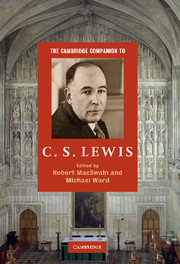1 - Introduction
Published online by Cambridge University Press: 28 November 2010
Summary
C.S. Lewis is both a phenomenon and an anomaly. He is a phenomenon in that, almost fifty years after his death, he remains one of the world's most popular and best-selling authors. And he remains so, not just in one genre but many: children's literature, science fiction, theology, philosophy, Christian apologetics, autobiography, essays, the novel, poetry. Remarkably, all of this output was incidental to his professional career as a highly respected scholar of medieval and Renaissance literature at Oxford and Cambridge. Despite enormous changes in the way literature in general is studied and despite substantial shifts in the scholarly landscape of his specific areas of expertise, his academic publications are still of considerable importance to students and specialists alike. Rather oddly for such a literary and donnish figure, even his personal life is part of the phenomenon. Numerous biographies have been written about him. Shadowlands, the story of his late marriage and eventual bereavement, won popular and critical acclaim as a television film, a stage play, a radio-play, and a movie. His most famous children's book - The Lion, the Witch and the Wardrobe (the first of the Chronicles of Narnia) - also achieved success as a major motion picture, and became one of the top-grossing films of 2005.
- Type
- Chapter
- Information
- The Cambridge Companion to C. S. Lewis , pp. 1 - 12Publisher: Cambridge University PressPrint publication year: 2010
- 1
- Cited by



